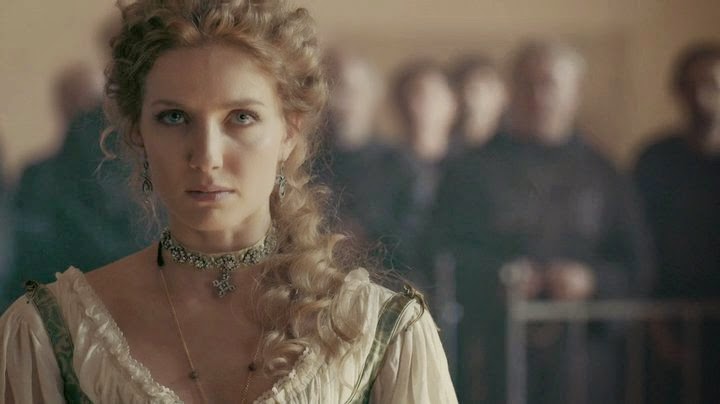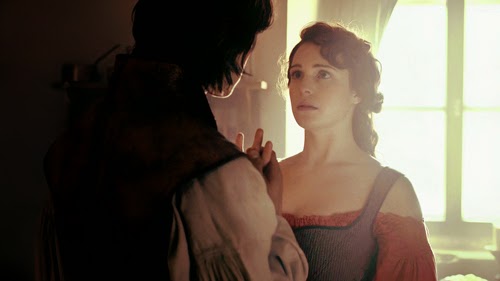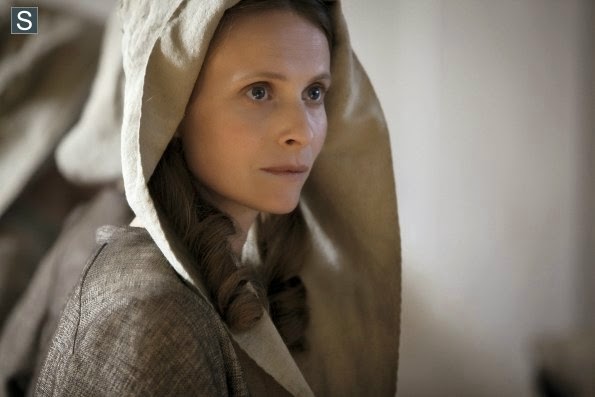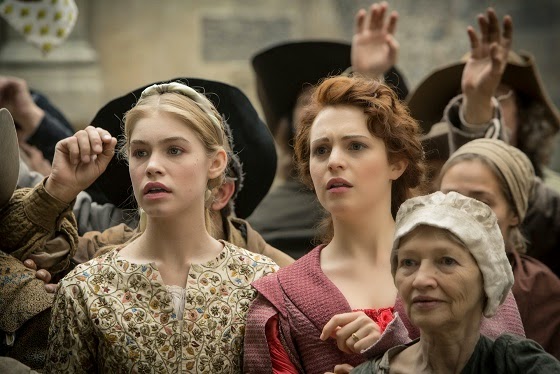Last week I talked (at length) about BBC's The Musketeers and their surprisingly progressive portrayal of race in this new adaptation. I like it. They've done a very good job at not just casting non-white actors in lead roles, but in actually trying to address the idea of what it means to be a person of color in early-Enlightenment France.
This week, though, I'd like to tackle a related and also uncomfortable topic: how the BBC's The Musketeers handles sex and romance, and whether or not this is even remotely period-accurate.
To begin with, though, we have to admit that judging the historical accuracy of a portrayal of sex and romance is actually a lot harder than judging the historical accuracy of portrayals of race. This is simply because most historical records of "romance" are incredibly biased. Either they come from popular literature, which would be like ascribing historical legitimacy to the Meg Ryan rom-coms of the 1990s, or they come from personal diaries and therefore anecdotal experience.
Furthermore, all attempts to study sex and romance in prior historical time periods tend to butt up against the simple reality that most of history is written by men. Because men were the ones who were educated enough to be able to write. So any idea we have of sex is going to be extremely male in point of view, simply by virtue of who wrote down what was going on. In the rare cases where we do have a female perspective on sex and romance, it's usually an educated, upper-class woman, the only kind of woman likely to get an education (except nuns) writing. And she definitely has a different experience than your average peasant lady.
Suffice it to say that any discussion of historical romance or sex is really complicated because when it comes down to it, we just plain don't know. But we can guess. And guess we will. (By guess, I mean that we will make logical inferences based on historical evidence, because that's how we roll.)
The Musketeers is based on Alexandre Dumas' The Three Musketeers, as you have hopefully already surmised, and as a result it's pretty bawdy. The characters in Dumas' classic were always sleeping their way into and out of trouble, and the characters of the BBC show are no different. Every male lead (excepting Captain Treville, which is interesting) has at least one female love interest, and most of them have a couple.
There are love triangles, love quadrangles, and some configurations too complex to really suss out, which is all fun and games and really and truly enjoyable. Interestingly, though, the show has taken a rather different route with their portrayal of the women behind these romances. Instead of it all being bedroom eyes and come-hither glances from female characters who are, we are assured, as pure as the driven snow, The Musketeers wants you to know without a doubt that, yes, these women have had sex. Some of them have had a lot of sex.
And most of them, brace yourself, have had non-consensual or at the very least dubiously-consensual sex.
In any other show, this fact would bother me. A lot. But I was already charmed by the show's handling of race, so I figured I'd see how this all played out. I'm still not entirely sure where I land on it, but I think I'm more favorable towards it than not. Here's why.
As I ranted so eloquently regarding Game of Thrones this season, I'm not okay with the use of rape as a filler or background noise or as a tool for the character development of men, and I definitely hate it when it's done gratuitously to shock viewers. I'm really not okay with the dumbing down of non-consensual sex and the idea that "she really wanted it in the end". The Musketeers doesn't do any of these things. Instead, the rape scenes are never shown, only referenced, and, interestingly, cover a range of situations and consequences.
The two main female characters of the show, Milady (Maimie McCoy) and Constance (Tamla Kari), both have storylines that deal with sexual assault/harassment. But they're dealt with very differently. In Milady's case, she accuses her brother-in-law of raping her, and then claims that she killed him in self-defense. If you don't know the larger story, Milady was once a poor thief who married a rich nobleman, Athos (Tom Burke). According Athos, when his brother discovered Milady's past, she killed him to keep it secret. According to Milady, his brother raped her, and she killed him by accident, trying to get away.
What's really compelling here is that, while Milady has proven herself very untrustworthy over the course of the show, and murdered a lot of people, we don't actually know if she's lying here. She could be, sure, but she very well might not be. And what I find most notable is that the show doesn't tell us one way or another, but it does give her story equal validity to Athos' version. Later on, Athos even cops to the idea that he might not know all the facts. He takes responsibility for the fact that his rash actions (sentencing her to death) might have been wrong.
This is notable because of the atmosphere we live in now. Women are frequently accused of inflating rape statistics and making false rape claims, and society considers the burden of proof to be on the woman to prove that she was raped, rather than on the man to prove that he did not rape her. That Milady's accusations are given story weight, a weight that does not redeem her character, mind, or excuse the awful things she's done, is kind of awesome.
On the other side of the spectrum, however, we have Constance Bonacieux. Constance deals with a more insidious, and probably more historical, form of sexual assault. We learn early on that she is married to a cloth merchant, only ever identified by his last name, Bonacieux (Bohdan Poraj). He is older than her, and the show makes it clear that this was an arranged marriage, not a love match.
The show goes even further to tell us that Constance is deeply unhappy in her marriage. She has no physical interest in her husband but does make it clear that she has sex with him, because, well, she's married to him. She doesn't have a choice in the matter. As the show progresses, and Constance falls in love with their renter, D'Artagnan (Luke Pasqualino), she is torn between her duty as a wife and her romantic feelings. We get the impression that this is the first time Constance has been in love, and we know for a fact she's never been in love with husband.
No, Constance's marriage, as we learn in episode seven or so, was a pure transaction. Her family sold her to Bonacieux in exchange for a small sum of money. She was an extra mouth to feed, and they didn't want her to end up an old maid, so she was married off as a teenager to a man she'd never met. We discover this when Constance tries to stop all of this from happening to her young cousin, Fleur (Alice Sanders). She is insistent that Fleur get the chance to live a happy life full of love, and get to be educated, and not have to marry some man she doesn't know.
So while the story never explicitly tells us that Constance has been raped, we are implicitly told this from the moment she comes on screen. And that, to me, is the more interesting storytelling choice. Because while Constance's situation is dubbed by the show to be "normal", it's also shown to be wrong.
In fact, at the very end of the first season (SPOILER), when Constance has finally decided to leave her husband and run away with D'Artagnan, she comes home to find that he's attempted suicide. He then guilts her into staying with him, saying that if she ever leaves, he will kill himself and it will be her fault. Far from being just a crappy thing to do, this is actually textbook abusive behavior, and gives an alarming view into what Constance's married life must be. Presumably this will come up more next season. It better.
In fact, if there were one hobby horse the show hit on just as often as it hit on race, it would be the horrible results of a culture based around transactional marriage. It's a storyline that comes up time and again, not just in Milady and Constance's storylines, but in the storylines of every single other female character on the show. Seriously.
We've got the story surrounding Queen Anne (Alexandra Dowling), a lovely and kind woman married to an overgrown child of a king. Anne is deeply unhappy in her marriage, which we are shown was definitely for strategic purposes and not even a little bit for love. Her husband, King Louis (Ryan Gage) isn't super pleased with her either. She's so serious and boring and hasn't had a son yet. Her lack of a male heir (or any heir) leads to rumors that she isn't fit to be queen, and puts a strain on her already strained marriage.
To complicate matters, Anne falls a little bit in love with Aramis (Santiago Cabrera), the Musketeer who keeps saving her life. We get the impression that in another world, Aramis and Anne might have been very happy together. Maybe. Or maybe not. But certainly not in this one, where Anne had no say in her romantic or sexual future.
Aramis pops up again in another storyline alongside this where we meet the woman he nearly married, Isabelle (Alice Patten). Isabelle was his childhood sweetheart, and when they were teenagers, she fell pregnant and they planned to marry. Sadly, she lost the child, and shortly thereafter her father spirited her away. Aramis was never able to find her again until, out of the blue, he discovers her at a convent, a nun, now called Sister Helene.
He's a little surprised, but even more so when she reveals that she wasn't put there against her will. She chose to join the convent because when she lost the child, she realized that the two of them had no future.
Aramis tries to protest, but Isabelle is insistent. They would have made each other miserable. Her without an education, stuck raising children in the countryside, and him deprived of excitement and adventure, stuck farming and feeding hungry mouths in some little cabin in the woods. While Aramis insists that he would have been happy, it's most telling when Isabelle rebuffs him, and makes it clear that she wouldn't have.
Heck, even the minor romantic interest characters touch on this topic. Athos has squishy-warm feelings for the lovely Ninon de Larroque (Annabelle Wallis), a noblewoman determined to change the state of female education in France. Her ambition nearly gets her burned at the stake as a witch, but the more interesting part of her storyline is her stance on marriage. While she completely believes in romance, Ninon makes it clear that any marriage she could enter would be transactional simply by virtue of her fortune. If she married, her husband would become the sole executor of her estate, and she would have no control.
Athos, I should point out, agrees with her that it's a stupid system, and the two of them have a heady moment of "Will we fall in love?" until circumstances force them apart. But it's not the circumstances entirely that are doing the forcing here. Neither Athos nor Ninon is comfortable with marriage and both of their reasons for discomfort are shown to be completely valid. Marriage in 1700s France is a pretty awful thing.
The one character who really falls outside this framework, I should point out, is Porthos' love interest (or one of them, dude gets around), Flea (Fiona Glascott). Flea isn't a noblewoman, or a middle-class shopkeeper's wife, or even a peasant. She's a thief and a lowlife, living in the Court of Miracles - Paris' underworld. Heck, Flea doesn't just live in the Court of Miracles, she runs it, and she makes it clear how much she loves it.
Flea is notable not just because she's a new perspective on this whole issue, but because out of all the female characters on the show, she's the one least hindered by ideas of propriety or marriage. As the character with the least connection to societal norms, Flea doesn't care if she gets married or not. Even when she is in a relationship, she doesn't let her boyfriend boss her around, and is totally comfortable kicking his butt. Even more notable?
When given the offer to leave her life of squalor and become an upstanding Musketeer's wife (an offer made on screen and mentioned as having been made in the past), Flea declines. She likes being free, and she has no intention of being anybody's wife. Being respectable never did anyone any good that she can see.
The thing is, she's kind of right.
Don't get me wrong. I, personally, am a fan of marriage. At least in the hypothetical. I would very much like to be married one day, and I'm not suggesting that we all take a tip from Flea's handbook and toss all societal norms out the window. But I do think there's something to be said for examining what we mean when we talk about marriage. Because as the show points out, there are a lot of different types of marriages, and not all of them, in fact, few of them, are actually about love.
Historically this rings true, at least as true as it can, given the caveat stated above about lack of proof and unreliable historical narrators. It's telling that the only love marriage on the show (Athos and Milady) ends in utter tragedy and disaster. That's probably a gross exaggeration on the actual historical situation, but I think it would be dangerous to dismiss the whole topic as taken out of proportion or historically inaccurate. I don't think it's historically inaccurate at all.
I mean, think about it. In pre-Enlightenment France, what value do women have outside of their roles as wife and mother? This is a time in history when women are codified as sexually inferior, and their position is as vessels for the continuation of families, not as people. Women exist, as far as historical record shows, pretty much for sex and babies and maybe some housework. That's about it.
In the upper classes, it's well documented that most marriages were based around strategic or financial negotiations, rather than love. But even on a middle-class level, as we see with Constance, marriages were determined by the need for everyone to be fed and clothed, and basic needs for food and shelter took precedence over romance. This is factored alongside the social stigma towards unmarried women. In other words, if you weren't married, what was the point of you? You're just a drain on resources, and you're a shame on your family.
Real marriage is supposed to be about two people becoming one spiritual entity. It's meant, if we're talking about "Christian marriage", to provide a way for two people to become more like Christ in their ability to love another person and, by growing closer to each other, to learn more how to be in relationship with God. Trust me, I know this, I've been to a bunch of weddings this year.
But let's be real. Most marriages aren't about that. Most marriages are about financial transactions or legal responsibility or getting to have sex a lot with the same person. All of which are potentially valid things. It's just important to consider that love marriages as we think of them, well, they're kind of a luxury, aren't they? And while I don't think that everything about The Musketeers' portrayal of sex and marriage is totally accurate (for starters why are all of the love interests white?), I do think it's a step in the right direction.
While there is a clear connection drawn between transactional marriage and prostitution, since both consist of the exchange of goods and money for sex, the show steers away from blaming the female characters for "duping" their poor husbands. Really, in this situation, everyone knows the score. Bonacieux might be a manipulative jerkface, or even some sadsack who doesn't know any better, but he's fully aware that his wife doesn't love him. He knew that going in. So instead of blaming female characters, the show rightly takes aim at society, the real villain here. It posits that in a patriarchal system where women's only value comes from their reproductive function, no one, not men or women, can find uncomplicated love.
While there is a clear connection drawn between transactional marriage and prostitution, since both consist of the exchange of goods and money for sex, the show steers away from blaming the female characters for "duping" their poor husbands. Really, in this situation, everyone knows the score. Bonacieux might be a manipulative jerkface, or even some sadsack who doesn't know any better, but he's fully aware that his wife doesn't love him. He knew that going in. So instead of blaming female characters, the show rightly takes aim at society, the real villain here. It posits that in a patriarchal system where women's only value comes from their reproductive function, no one, not men or women, can find uncomplicated love.
The show makes it clear that a society where marriage is primarily about a financial or social transaction is a broken society. It's not just that the show gives us examples of unhappy marriages or that it points out how most marriages in that society cannot be equal because of how the law is established. It's that the show tells us these things, and then makes us unhappy about it. It says, "This is wrong!" and then tells the story in such a way that you feel angry about how wrong society is. Constance shouldn't be married off to some random guy for financial reasons! She should get to be educated and marry for love.
Isabelle shouldn't have to choose between a shotgun wedding and holy orders, with those as her only two options. Anne should get a say in who she marries, and not just get passed around as a treaty with a woman attached. Milady should have the social freedom to be an equal in her marriage, and the right to be listened to when making a serious allegation of sexual assault. Ninon shouldn't be afraid her husband will rob her blind. Flea shouldn't have to think that the only way to stay free is to stay an outlaw.
None of that is okay. And we need to be reminded of that.










What a difference a focus on those most affected makes. It doesn't even have to be an exclusive focus - since I'd imagine the primary one is on the muskateers themselves - but having it there matters. Cf Game of Thrones, which I know you already did, and how it couldn't spare two minutes for Cersei, who's one of the main bloody characters.
ReplyDeleteDefinitely! The way the narrative is focused on telling stories about the disadvantaged instead of uniformly representing those in power makes a huge difference. I mean, yeah, the Musketeers are the main characters, but they're a diverse group of men, both racially and in terms of social class and economic access. The whole show seems to be convinced that in order to tell good stories you need diverse, interesting characters. Yay!
DeleteNow I've had a chance to see the first season...
ReplyDeleteAs the show progresses, and Constance falls in love with their renter, D'Artagnan (Luke Pasqualino), she is torn between her duty as a wife and her romantic feelings.
I do like - nay, I do love - that Constance's feelings aren't just about D'Artagnan. She's also relishing the sudden appearance of derring-do in her life, because she gets to be brave and tough and shooty and fatale and all kinds of stuff she'd never have imagined getting to be, and the why hell wouldn't she be all over that?
Also, it's rather cool that when the Musketeers rope her into their bizarre schemes... well, they might be presuming on her, but they're also implicitly presuming she's capableof playing those parts. And that's not an unpleasant thing to have presumed about you.
Ninon makes it clear that any marriage she could enter would be transactional simply by virtue of her fortune.
Presumably the same would go for Widow Alice and Porthos, but the subject doesn't come up there - which is ironic, given that their first dates are about Porthos trying to hit her up for money. But by the time the idea of marriage comes up, it's clear it would be a love match.
But I like not getting the sense that I supposed to regard Ninon as more selfish than Alice or Alice as weaker than Ninon - or judge between any of these women in general.
Also, as an example of sheer awesome: the nun throwing the beehive at the mercenaries.
I really appreciate that aspect of Constance. I love that it turns her into a much more interesting love interest as well. Because she's not standing behind D'Artagnan, waving a hanky and begging him to come home safe. She's chasing after him, yelling at him, and demanding he give her a gun. It makes her much more compelling, and it shows that she really loves his life, which honestly speaks quite well for the future of their relationship.
DeleteWe are never asked to compare Ninon and Alice, not really, which is rare for a show like this and utterly fantastic.
Also that nun is like my favorite character.
What's really compelling here is that, while Milady has proven herself very untrustworthy over the course of the show, and murdered a lot of people, we don't actually know if she's lying here.
ReplyDeleteGah!. Having seen the second series now, the implication is that she's not lying.
DeleteI know, right? Intense.
DeleteThis comment has been removed by the author.
ReplyDeleteNice Informative Blog having nice sharing.. Порно видео - ZADROT
ReplyDeleteKOLKATA ESCORTS
ReplyDeleteKOLKATA ESCORT
KOLKATA ESCORT SERVICE
KOLKATA INDEPENDENT ESCORTS
KOLKATA INDEPENDENT ESCORT
ESCORT IN KOLKATA
ESCORTS IN KOLKATA
VILLAGE CALL GIRLS
VILLAGE CALL GIRL
CALL GIRL
CALL GIRLS
ESCORT
ESCORTS
KOLKATA FEMALE ESCORTS
KOLKATA HOTEL ESCORTS
KOLKATA MODEL ESCORTS
KOLKATA CALL GIRL
KOLKATA CALL GIRL SERVICE
KOLKATA CALL GIRL SERVICE
KOLKATA CALL GIRLS
CALL GIRL
CALL GIRLS
CALL GIRLS SERVICE
CALL GIRL SERVICE
KOLKATA INDEPENDENT CALL GIRLS
KOLKATA INDEPENDENT CALL GIRL
ESCORT
KOLKATA ESCORTS
KOLKATA ESCORT
KOLKATA ESCORT SERVICE
KOLKATA INDEPENDENT ESCORTS
KOLKATA INDEPENDENT ESCORT
ESCORT IN KOLKATA
ESCORTS IN KOLKATA